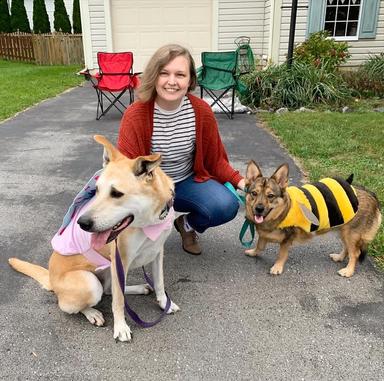New Puppy Checklist: What To Know Before Adopting A Dog
Adopting a new puppy? We've created a checklist to help you get organized before bringing your new friend home.
Adopting a new puppy? We've created a checklist to help you get organized before bringing your new friend home.
by Savannah Admire, | July 3, 2023

Samantha Gehrmann / Stocksy
If you’ve ever stumbled across a pet adoption event, chances are you’ve been tempted to take home a puppy of your own. But adopting a puppy (or dog of any age) is a big responsibility and requires plenty of planning, so learn all about how to prepare for a new puppy below.
Plenty of puppies and dogs are available across the country who would be delighted to have a loving home. There are a few options for how you can bring one (or more!) of these pups into your life.
Many shelters have puppies available for adoption, and you can be their hero by adopting them and giving them a much-needed home. You may also consider adopting a puppy from a breeder, but if you do, do your research and be wary of “puppy mills” or other irresponsible or unethical breeders.
If you’ve never had a dog before, you may want to consider fostering to see if pet parenthood is a good fit for your lifestyle and learn what questions to ask when adopting a dog.
While puppies are adorable and fun, they’re also a lot of work. Plenty of older dogs in shelters need homes, and they’re far less likely to be adopted, so it may be worth considering making a senior dog part of your family if your lifestyle isn’t suited to the commitment of raising a puppy.
Before you bring a puppy home, you should know just what a big responsibility raising and training one can be.
No puppy should be adopted until they are over eight weeks old — up until this time, they’re dependent on their mother and also benefit from being with their littermates. Although dogs are considered puppies until they’re between 12 and 18 months old, the time between seven and 14 weeks is the most impressionable stage of a puppy’s life. It’s at this point that they form their strongest bonds and learn about the world around them.
Your new puppy may also be a bit hesitant or shy during their first days in the house and may even whine or cry throughout the night in their crate. Once they’ve settled into their new homes, though, puppies tend to be very curious and eager to explore, so make sure to set aside a specific space in your house for your puppy. Remember that every dog is different, so pay attention to your puppy’s individual personality and learn how they respond to new experiences.
Choose a food specifically designed for puppies, as they have different dietary needs than adult dogs. The shelter or breeder you adopt from can tell you what food they’ve been feeding your puppy, so you can continue to feed your puppy that brand, or transition to a new one.
While all dogs need plenty of exercise, it’s a good idea to take things slow with a new puppy. Try just five minutes of daily exercise for each month of your puppy’s age, so 10 minutes for a two-month-old pup.
Be sure to buy toys for your puppy to keep them entertained. You can use puzzle toys to keep your pup’s mind busy and give them something to do when you’re away, and chew toys for teething.
Regular grooming can help your puppy get used to handling, which will be useful for vet visits and interactions with a professional groomer.
You should schedule an appointment with a veterinarian within three to five days of bringing your new puppy home. Your puppy will need a series of vaccines, and it’s a good idea to establish a relationship with a vet right away.
Know what to get for a new puppy so you can have everything your dog needs before they come home.
Puppies need bowls that are the right size for them, and they should be made of a durable material that won’t be easily chewed up, like stainless steel or ceramic.
A crate is a great way to keep your puppy safe and secure when you’re not home and gives them a safe and comfortable space to call their own, in addition to helping with house training.
Make sure to add toys to your new puppy supplies list to keep them entertained and out of trouble. Choose toys that are appropriate for their age and size, and avoid toys that are small enough to be swallowed.
A collar and leash are essential for walks and other outings. Make sure the collar is the right size for your puppy, and choose a leash that is durable and easy to hold.
Brush out your dog’s coat for around 30 minutes twice a week and trim their nails every month or so.
Puppies need to be groomed regularly, so you’ll need to invest in some basic supplies, such as a brush, comb, and nail clippers.
Puppies have to start from scratch with training, so be patient and start with the basics at home, such as sit and come. Always use positive, reward-based training to help your puppy see training as a fun thing to do. House training is also a big part of training your puppy. Understand that accidents will happen and full house training may take several months.
If you plan on training your puppy yourself, you’ll need to purchase some basic supplies, such as treats, a clicker, and a harness, so add those items to your new dog essentials list.
Bonding with your puppy is important to helping them feel comfortable and happy in their new home.
Puppies require a lot of time and attention. Before bringing one home, make sure you have the time to dedicate to their care. Plan out a routine and stick to it.
Puppies need to be trained, which takes time and patience. Be prepared to put in the work to teach your puppy basic commands. You may want to sign up for puppy training classes, which can also help with socialization.
Puppies need to be socialized with different people, places, and things as early as possible. This will help them become well-rounded dogs and reduce their chances of developing behavioral problems.
Your dog will need monthly heartworm and flea prevention, both of which are available in chewable pills. Bring your paperwork from the breeder or shelter to your first vet appointment, so your veterinarian can schedule future vaccinations.
Before you start visiting shelters and rescues, know how to prepare for bringing a new puppy into your home by compiling a checklist for a new dog.
If you’re interested in a specific dog breed, research their traits and needs to determine if that breed will fit with your lifestyle. For example, if you live in a small apartment, a large dog that needs frequent exercise probably isn’t a good fit.
Choose a decent-sized crate for your puppy (large enough for them to turn around easily) and fill it with bedding and blankets, plus some safe, cuddly toys.
Create a specific space for your puppy and keep chewable items, like electrical cords and wires, out of reach. Also make sure all other rooms are dog-proofed as well.
The 3-3-3 rule covers the common phases a dog will go through before settling into their new home and is one of the most important things to know before getting a puppy. In the first three days, they may feel overwhelmed; in the first three weeks, they will begin to get into a routine. After the first three months, your dog will likely feel completely comfortable.
Bringing a new puppy into your home requires patience and planning, but it can also be a lot of fun. By following the tips in this article and knowing what things to buy a new puppy, you can be prepared to provide your new furry friend with the best possible care.
The 3-3-3 rule covers the common phases a dog will go through before settling into their new home.
Training and caring for a puppy requires patience and a full-time commitment. Reviewing a new pet checklist can help prepare you for what to expect.
Puppies need food and water bowls, a crate and bedding, a collar and leash, and plenty of toys.
Choose a designated space for your puppy and keep chewable items out of reach. You should also dog-proof all rooms in your home.
To ensure a smooth transition for your new dog, spend time playing with them, petting them, and grooming them to develop a bond.
Dogs likely feel excited to leave the shelter and go somewhere new, especially when you put in the effort to make their experience a positive one and provide all the stuff for a puppy to feel at home.

Savannah Admire is a writer, editor, and pet parent to two dogs and a cat. When she’s not writing, you can find her reading, playing Animal Crossing, or being an obnoxious nerd about her favorite movies and TV shows. She lives in Maryland, where she constantly debates whether or not to get a third dog.